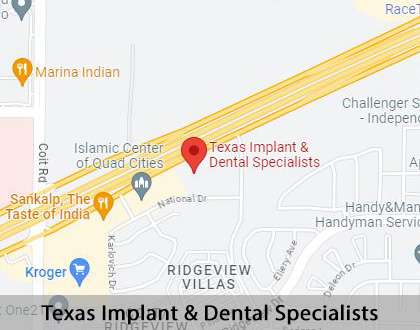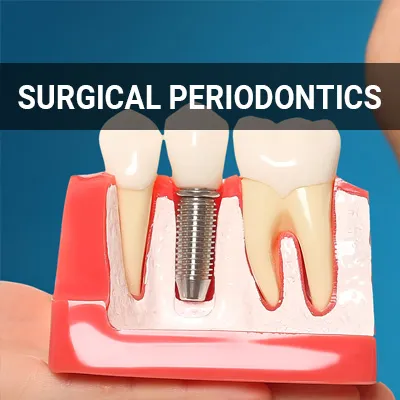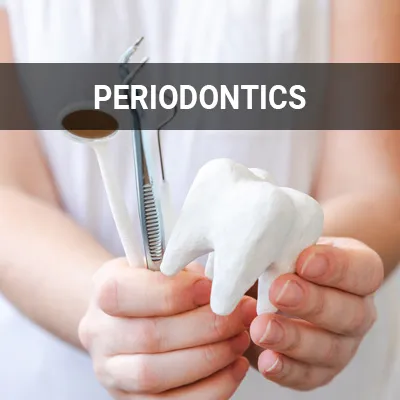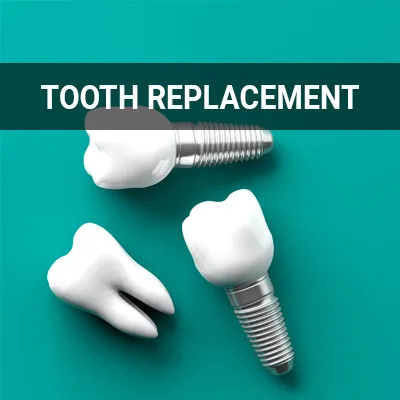Sedation Dentistry Plano, TX
Sedation dentistry can help even the most anxious of patients relax in the dentist's chair. If your fear of receiving dental care is holding you back from taking care of your oral health, sedation dentistry may be right for you. Sedation dentistry administers medication to help patients relax throughout their procedures.
Sedation dentistry is available at Texas Implant & Dental Specialists in Plano and the surrounding area. Do not delay in getting the dental work you need. Call us today at (972) 535-6555 to schedule an appointment or learn more about our services.
Understanding Sedation Dentistry
According to WebMD, sedation dentistry "uses medication to help patients relax during dental procedures." While occasionally referred to as "sleep dentistry," the two are not interchangeable terms. With the exception of those under general anesthesia, patients under sedation are usually awake. There are four different levels of sedation dentistry:
- Minimal sedation (where the patient is awake but relaxed)
- Moderate sedation (also known as “conscious sedation,” where the patient may not remember much of the procedure)
- Deep sedation (where the patient is on the edge of consciousness)
- General anesthesia (where the patient is completely unconscious)
“With the exception of those under general anesthesia, patients under sedation are usually awake.”
Conditions That May Require Sedation
Sedation dentistry can most benefit those with a genuine fear or anxiety revolving around dental healthcare. However, it can also benefit those who:
- Cannot sit still in the dentist’s chair
- Have a bad gag reflex
- Have a low pain threshold
- Have very sensitive teeth
- Need a large amount of dental work completed
Sometimes children are given sedation if they are scared of the dentist or cannot cooperate during the visit. Nitrous oxide is safe for most children, and most dentists can administer it. Some dentists are also trained to give children oral sedation, which is safe when kept within the recommended dose for the patient's age and weight.
“Sedation dentistry can most benefit those with a genuine fear or anxiety revolving around dental healthcare.”
Types of Sedation Dentistry
There are four different types of sedation used in sedation dentistry. These include:
- Inhaled minimal sedation
- Oral sedation
- IV moderate sedation
- Deep sedation and general anesthesia
Inhaled minimal sedation is also known as nitrous oxide, otherwise known as "laughing gas." The dentist can control the amount of gas the patient receives, thus controlling their level of relaxation. Its effects tend to wear off quickly, making it the only form of sedation where the patient may drive themselves home after their procedure. Oral sedation can be anywhere from minimal to moderate, depending on the total dosage. For some people, moderate oral sedation is enough to cause them to fall asleep during the procedure. However, they can usually be awakened with a gentle shake.
IV moderate sedation involves administering the sedative intravenously, allowing it to work more quickly. This method allows the dentist to continually adjust the patient's sedation level. Finally, deep sedation and general anesthesia are medications that will render the patient either almost or totally unconscious during the procedure.
“There are four different types of sedation used in sedation dentistry.”
Check out what others are saying about our dental services on Yelp: Sedation Dentistry in Plano, TX
Advantages and Disadvantages of Sedation Dentistry
The most obvious advantage of sedation dentistry is that it soothes the patient, helping them relax for the duration of their procedure. It also often helps make it easier for the practitioner to operate, as the patient cannot move against their will. This is particularly true with children, who are extra prone to being fidgety when nervous. Many patients with dental anxiety also like that general anesthesia induces a form of amnesia where they have no lasting memory of the procedure.
However, patients should also consider some potential disadvantages of sedation dentistry. For one, it often requires a practitioner who has undergone advanced training, as not every dentist can administer or offer sedation. Similarly, a trained team is necessary, along with the proper equipment and facilities. This may limit a patient's choices in dental practitioners.
“The most obvious advantage of sedation dentistry is that it soothes the patient, rendering them mostly or completely relaxed for the duration of their procedure.”
Questions Answered on This Page
Q. What is sedation dentistry?
Q. Is sedation dentistry right for me?
Q. What are the different types of sedation dentistry?
Q. What are the advantages and disadvantages of sedation dentistry?
Q. Am I a candidate for sedation dentistry?
People Also Ask
Q. Do I need surgical periodontics?
Q. What is periodontics? Why is gum health important?
Q. Why would I need a gum dentist?
Q. How do I find a periodontist near me?
Q. What are the most common signs and symptoms of periodontal tooth loss?
Candidates for Sedation Dentistry
Sedation dentistry is safe for most patients. According to Mayo Clinic, most people are able to undergo general anesthesia without any problems, even those with significant health conditions. In general, one's risk for complications depends upon the type of procedure they are undergoing and their general physical health rather than on the type of anesthesia.
Patients should also let us know if they have any preexisting conditions or are currently taking any drugs, medications, or supplements. It is also crucial for patients to let us know if they have any allergies. From there, we can determine which sedation option, if any, is appropriate for the patient's unique needs.
“Sedation dentistry is safe for most patients.”
Frequently Asked Questions
Q. Can my child undergo oral sedation?
A. It depends. In most cases, however, we will opt to avoid oral sedation in children unless absolutely necessary. Nitrous oxide is usually the best option for children.
Q. Are there side effects to oral sedation?
A. Side effects of oral sedation are not uncommon. These may include dry mouth during or after the procedure, nausea, grogginess, and headache. However, the above list is not exhaustive. We will prepare you for what to expect.
Q. Does sedation dentistry also help relieve pain?
A. Sedatives can help to ease fear, while anesthesia helps relieve pain. This combination allows the patient to have the most comfortable experience possible. We will do everything in our power to keep you safe and relaxed throughout your procedure.
Q. How long will I be under sedation?
A. It depends on the type of dental work you are having done. In general, it ranges from one to six hours. However, inhaled sedation typically subsides quickly.
Q. What is the difference between sedation dentistry and sleep dentistry?
A. While sedation dentistry involves the use of a sedative to relax the patient, it does not involve putting the patient to sleep. In contrast, sleep dentistry uses deep sedation or general anesthesia to put the patient to sleep.
Start Feeling Better – Visit Us Today
By visiting us as soon as possible, our team can help get you the professional treatment you need. Instead of waiting around and allowing the symptoms to get worse, we can provide you with treatment options.
Definitions
Call Us Today
Dental anxiety no longer has to stop you from going to the dentist. We at Texas Implant & Dental Specialists can help. Call us today at 972-535-6555 to schedule an appointment or learn more about our services.
Helpful Related Links
- American Academy of Periodontology (AAP). American Academy of Periodontology (AAP). 2023
- Center for Disease Control and Prevention (CDC), Periodontal Disease Page. Center for Disease Control and Prevention (CDC), Periodontal Disease Page. 2023
- WebMD, What Is a Periodontist?. WebMD, What Is a Periodontist?. 2023
About our business and website security
- Texas Implant & Dental Specialists was established in 2007.
- We accept the following payment methods: American Express, Cash, Check, Discover, MasterCard, and Visa
- We serve patients from the following counties: Collin County, Denton County and Dallas County
- We serve patients from the following cities: Plano, Frisco, Allen, McKinney, Garland, Richardson, Prosper, Wylie, Murphy, and Dallas
- Norton Safe Web. View Details
- Trend Micro Site Safety Center. View Details
Back to top of Sedation Dentistry










